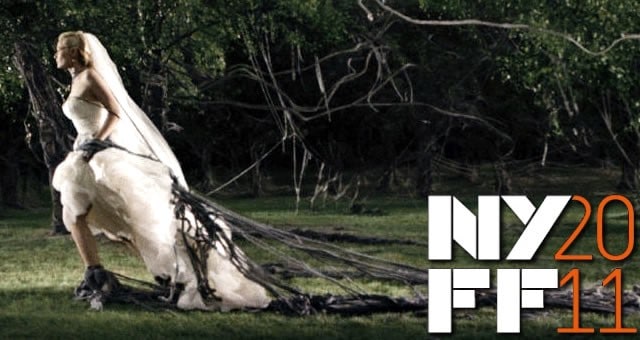
The last time Lars von Trier explored a relationship in decay, the divisive auteur could not have been more in your face. While parts of Antichrist were labeled as pure button-pushing, it was button-pushing in the greatest way possible. The director made a 2-hour endurance test, a great one at that.
His latest, Melancholia, is not an endurance test. Right from the beginning prologue, which paints a picture of events to come, von Trier sucks one into his world of emotional and cynical chaos. The whole film, despite von Trier’s bombastic filmmaking nature, is surprisingly grounded. This isn’t about the destruction of earth, but of these characters.
The apocalypse is only used to symbolize all of the characters’ emotional deterioration.
Melancholia, the planet, represents Justine (Kirsten Dunst). It’s a bright and beautiful object at first, which slowly tears down everything it comes in contact with. When we first see the beautiful bride, she couldn’t be more appealing. The same sentiment applies for the planet that’s soon going to destroy us all – initially it’s a gorgeous sight to behold, then it consumes you with terror and anger. On the other side of the Justine (a.k.a. Melancholia) is Claire (Charlotte Gainsbourg), who represents Earth. There’s an initial elegance and calm there, a sense of soothingness that Melancholia destroys, like Justine does to Claire.
As the film goes along, the more cynical of an outlook the film takes on. Warm and charming characters, such as Kiefer Sutherland’s character, John, breakdown. The whole ensemble sinks to a lower level. Midway through the film, Justine has a slightly awkward line about meatloaf tasting like ash, but what she really means is everyone is going to be ash. They’re all on a path to become to becoming dust, and Justine is first going to destroy them to make that possible.
Dunst’s depressed lead wants everything to end, and not just for herself. She believes people are evil, nothing more. Justinesenses that the end of time is approaching, and perhaps she is a part of it. What does she do in the eve of the apocalypse? Revel in it. There’s a haunting scene of Claire following Justine into the woods, where she witnesses her despicable sister lying naked while bathing in Melancholia’s light as if she’s worshiping it.
Obviously, von Trier found a perfect lead that expresses his same morbid thematic interests.
What isn’t morbid, surprisingly, is a good chunk of Melancholia. Previously, von Trier seemed more than happy to punish his characters in the most physical and mentally abusive ways imaginable. Oddly, this time around, the filmmaker expresses a great deal of empathy.
If you have the opportunity to see some of the most striking and provocative shots of the year, then find the biggest screen possible that’s showing Melancholia. However, if you’re in the middle of nowhere and your hand is forced to rent the film on VOD, fair enough. Bold, gorgeous, and emotionally tough, von Trier has made a dark dramedy about the apocalyptic stakes of an emotional breakdown.
The Upside: A tremendous ensemble giving their best work; Kiefer Sutherland is the standout, who flaunts confidence early on in the film, but winds up being the most insecure character in the film; has some beautiful imagery; becomes more powerful the more one reflects upon it.
The Downside: The first half’s attention to capturing mundane, real-life moments is admirable, but it can get tiresome. Although, that tedious feeling may have been Trier’s intention.
On The Side: Melancholia also serves as a reminder of how awkward and dull weddings usually are.
Related Topics: NYFF

